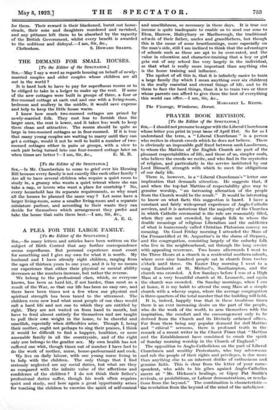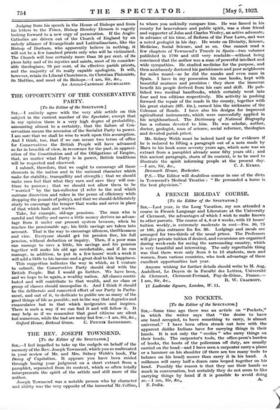PRAYER BOOK REVISION.
[To the Editor of the SPECTATOR.]
Sta,—I should not presume to argue w(th the Liberal Churchman whose letter you print in'your issue of April 21st. So far as I understand the term, a "Liberal Churchman" is a person who recites in churoh creeds which he does not believe. There is obviously an impossible gulf fixed between such Laodiceans, to whom the Mattins of the English Church are part of the pleasant respectabilities of life, and those of us, simpler souls, who believe the creeds we recite, and who find in the mysteries of religion, and particularly in the service instituted by out Lord Himself, strength with which to meet the obligations of our daily life.
There is, however, in a "Liberal Churchman's" letter one implication that demands attention. He suggests that, if and when the top-hat Vattins of respectability give way to genuine worship, "an increasing alienation of the people from the Church would be the result." It would be interesting to know on what facts this suggestion is based. I have a constant and fairly widespread experience of Anglo-Catholic services, and it is notorious that the majority of the Churches in which Catholic ceremonial is the rule are reasonably filled, when they are not crowded, by simple folk to whom the double meanings of religious Liberalism and the subtleties of what is humorously called Christian Platonism convey no meaning. On Good Friday morning I attended the Mass of the Presanctified at St. Augustine's in the slums of Stepney, and the congregation, consisting largely of the unlucky folk who live in the neighbourhood, sat through the long service with appealing reverence. Two hours afterwards I Went to the Three Hours at a church in a residential southern suburb, where over nine hundred people sat in church from twelve o'clock until three. On Easter Day morning I went to a sung Eucharist at St. Michael's, Southampton, and the church was crowded. A few Sundays before I was at a High Mass at a very beautiful church at St. Leonards, and again the church was crowded. On Sunday mornings, when I am at home, it is my habit to attend the sung Mass at a simple church with a wheezy organ, where the average congregation is three-quarters of the total number that the building will hold.
It is, indeed, happily true that in these troublous times there is an ever increasing desire on the part of the people, who do the work of the world, to arm themselves with the inspiration, the comfort and the encouragement only to be derived from the Church and its Divinely ordained offices. Far from there being any popular demand for dull Mattim and " ethical " sermons, there is profound truth in the remark of a recent writer in the Church Times that "Matting and the Establishment have combined to crush the spirit of Sunday morning worship in the Church of England."
The opposition to Anglo-Catholicism on the part of Liberal
Churchmen and wealthy Protestants, who buy advowsons and rob the people of their rights and privileges, is due more than anything else to an inherent dislike of enthusiasm and genuine faith. This is clear from the letter of your corre- spondent, who adds to his gibes against Anglo-Catholics sneers at "Mr. Hickson's healings, or Gipsy Pat Smith's revivals, or prohibitions, or Labour demonstrations, or revela- tions from the beyond." The combination is characteristic— the revelation from the beyond of the mind of the unbeliever.
Judging from his speech in the House of Bishops and from his letters to the Times, Bishop Hensley Henson is eagerly looking forward to a new orgy of persecution. If the Anglo- Catholics are driven out of the Church of England by an unholy alliance of Evangelicals and Latitudinarians, like the Bishop of Durham, who apparently believe in nothing, it will not be a few hundred priests only who will be victimized. The Church will lose certainly more than 50 per cent. of its pious laity and of its mystics and saints, most of its consider- able theologians, 70 per cent. of its effective parish priests, and the majority of its really capable apologists. It will, however, retain its Liberal Churchmen, its Christian Platonists, its Mattins, and most of its Bishops.—! am, Sir, &e., AN ANGLO-CATHOLIC JOURNALIST.















































 Previous page
Previous page